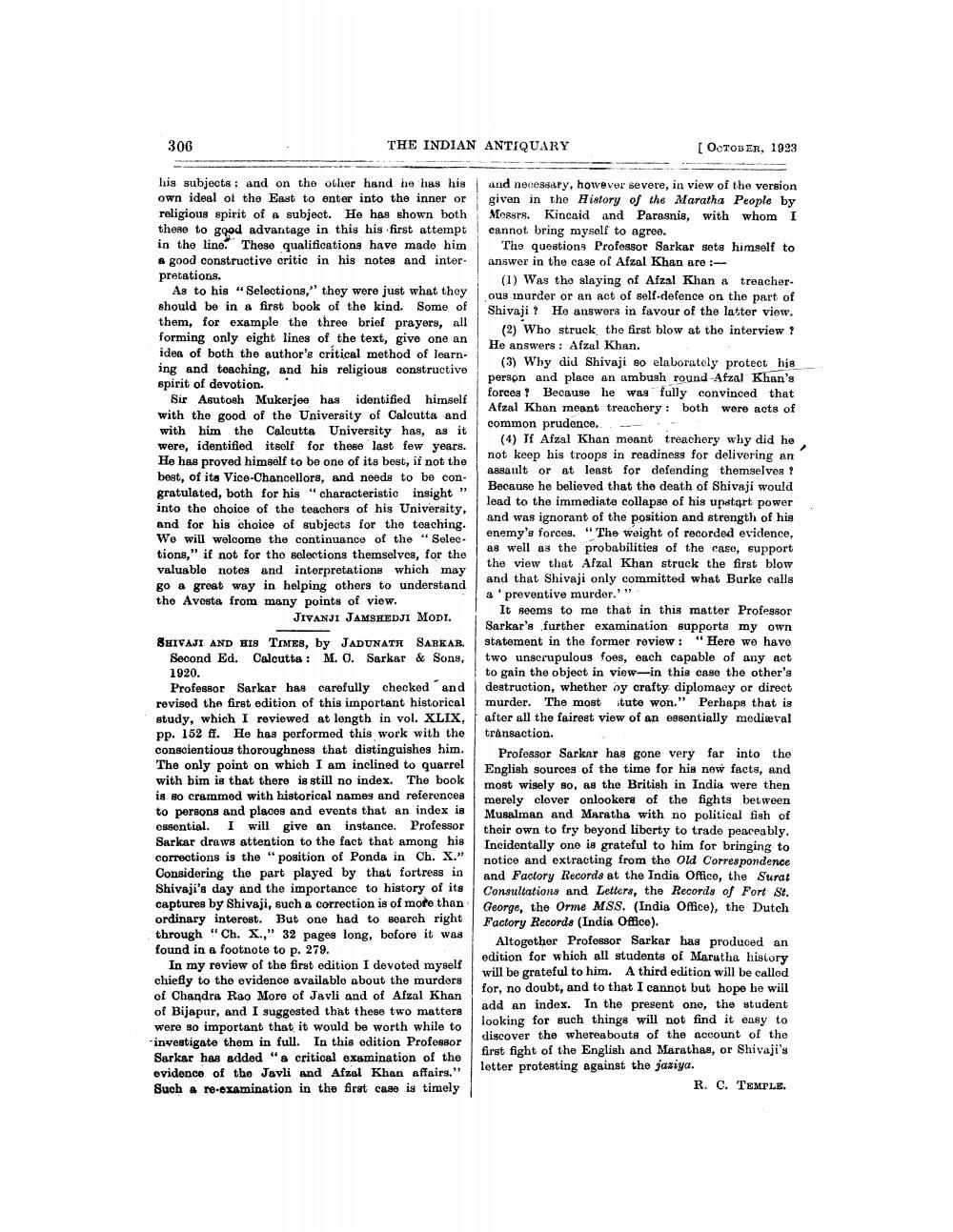________________
306
THE INDIAN ANTIQUARY
[ OCTOBER, 1923
his subjects: and on the other hand he has his own ideal of the East to enter into the inner or religious spirit of a subject. He has shown both these to good advantage in this his first attempt in the line. Those qualifications have made him a good constructive critic in his notes and interpretations.
As to his "Selections, they were just what they should be in a first book of the kind. Some of them, for example the three brief prayers, all forming only eight lines of the text, give one an idea of both the author's critical method of learn. ing and teaching, and his religious constructive spirit of devotion.
Sir Asutosh Mukerjee has identified himself with the good of the University of Calcutta and with him the Calcutta University has, as it were, identified itself for these last few years. He has proved himself to be one of its best, if not the best, of its Vice-Chancellors, and needs to be congratulated, both for his "characteristic insight into the choice of the teachers of his University, and for his choice of subjects for the teaching. Wo will welcome the continuance of the “Selec. tions," if not for tho selections themselves, for the valuable notes and interpretations which may go a great way in helping others to understand the Avosta from many points of view.
JIVANJI JAMSHEDJI MODI. SHIVAJI AND HIS TIMES, by JADUNATA SARKAR.
Second Ed. Calcutta : M. O. Sarkar & Song, 1920.
Professor Sarkar has carefully checked and revised the first edition of this important historical study, which I reviewed at length in vol. XLIX, pp. 152 fr. He has performed this work with the conscientious thoroughness that distinguishes him. The only point on which I am inclined to quarrel with bim is that there is still no index. The book is go crammed with historical names and references to persons and places and events that an index is essential. I will give an instance. Professor Sarkar draws attention to the fact that among his corrections is the "position of Ponda in Ch. X." Considering the part played by that fortress in Shivaji's day and the importance to history of its captures by Shivaji, such a correction is of more than ordinary interest. But one had to search right through "Ch. X.," 32 pages long, bofore it was found in a footnote to p. 279.
In my review of the first edition I devoted myself chiefly to the evidence available about the murders of Chandra Rao More of Javli and of Afzal Khan of Bijapur, and I suggested that these two matters were so important that it would be worth while to -investigate them in full. In this edition Professor Sarkar has added "& critical examination of the ovidence of the Javli and Afzal Khan affairs." Such a re-examination in the first case is timely
und necessary, however severe, in view of the version given in the History of the Maratha People by Messrs. Kincaid and Parasnis, with whom I cannot bring myself to agree.
The questions Professor Sarkar sets himself to answer in the case of Afzal Khan are :
(1) Was tho slaying of Afzal Khan a treacher. ous murder or an act of self-defence on the part of Shivaji? He answers in favour of the latter view.
(2) Who struck, the first blow at the interview ? He answers: Afzal Khan.
(3) Why did Shivaji so elaborately protect his person and place an ambush round-Afzal Khan's forces ? Because he was fully convinced that Afzal Khan meant treachery : both were acts of common prudence.. --
(4) Tf Afzal Khan meant treachery why did he not keep his troops in readiness for delivering an Assault or at least for defending themselves? Because he believed that the death of Shivaji would lead to the immediate collapse of his upstart power and was ignorant of the position and strength of his enemy's forces. "The weight of recorded evidence, as well as the probabilities of the caso, support the view that Afzal Khan struck the first blow and that Shivaji only committed what Burke calls a preventive murder.""
It seems to me that in this matter Professor Sarkar's further examination supports my own statement in the former review: "Here we havo two unscrupulous foes, each capable of any act to gain the object in view-in this case the other's destruction, whether oy crafty diplomacy or direct murder. The most stute won." Perhaps that is after all the faireet view of an essentially mediaeval transaction.
Professor Sarkar has gone very far into the English sources of the time for his new facts, and most wisely so, as the British in India were then merely clover onlookers of the fights between Musalman and Maratha with no political fish of their own to fry beyond liberty to trado peaceably. Incidentally one is grateful to him for bringing to notice and extracting from the Old Correspondence and Factory Records at the India Office, the Surat Consultations and Letters, the Records of Fort St. George, the Orme MSS. (India Office), the Dutch Factory Records (India Ofice).
Altogether Professor Sarkar has produced an edition for which all students of Maratha history will be grateful to him. A third edition will be called for, no doubt, and to that I cannot but hope he will add an index. In the present one, the student looking for such things will not find it easy to discover the whereabouts of the account of the first fight of the English and Marathas, or Shivaji's letter protesting against the jaziya.
R. C. TEMPLE.




